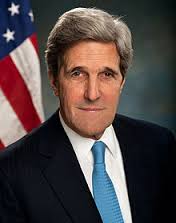
MONTREUX, Switzerland (Press Release) — U.S. Secretary of State John Kerry on Wednesday, March 4, defended the P5+1 talks with Iran following a negotiating session. While he did not mention Israel’s Prime Minister Benjamin Netanyahu by name, his comments addressed some of the issues Netanyahu raised on March 4 in his address to Congress
SECRETARY KERRY: So good afternoon to all, and thank you very, very much for your patience. We’ve been involved in some long discussions over the past few days, and even well before that. And before I leave Montreux, I wanted to quickly share with you where we are.
From the beginning, these negotiations have been tough and intense, and they remain so. And we’ve made some progress from where we were, but there are still significant gaps and important choices that need to be made. The purpose of these negotiations is not to get any deal; it’s to get the right deal, one that can withstand scrutiny – the scrutiny of experts on nuclear affairs all around the world, the scrutiny of other governments, the scrutiny of people, the scrutiny of the Congress of the United States, people in America, and the scrutiny of countries in the region that are affected by it. And so we know that. We approach these negotiations with a full understanding of the test that will be applied to this and of the expectations that exist.
We also want an agreement that is sustainable over time, and particularly that achieves the singular goal of proving that Iran’s nuclear program is and will remain peaceful. We aren’t going to be distracted by external factors or politics. We will continue to be guided by our experts, our scientists, our national interests and those of our partners and allies.
Now, for all the objections that any country has to Iranian activities in the region – and believe me, we have objections and others in the world have objections – the first step is to prevent Iran from acquiring a nuclear weapon. And we know that absent a deal, Iran will have the ability to move ahead with its nuclear program; that we know for sure, because that’s exactly what’s happened to date. We also know that any deal that we would agree to would significantly increase the breakout time, leaving Iran further – far further than it is today – from producing enough fissile material for a weapon, while it undertakes the effort of proving to the world that the program is, in fact, peaceful.
Clearly, increased breakout time makes any nation in the vicinity or any nation of concern safer. We also know that any deal that we reach would give us the intrusive access and verification measures necessary to confirm that Iran’s nuclear facilities are indeed on a peaceful path. And that would allow us to promptly detect any attempt to cheat or to break out, and then to respond appropriately. And contrary to some public reports, we are only contemplating a deal in which important access and verification measures will endure.
We also know that the international sanctions, which many want to simply hang their hats on – they may have gotten Iran to the table, but to date they haven’t stopped Iran from advancing its nuclear program. In fact, the first and only thing that had stopped their program from progressing in almost a decade was the Joint Plan of Action that we negotiated and we reached in November of 2013, and that has been adhered to in every single respect since then.
And most importantly, as President Obama said yesterday, we know that no one has presented a more viable, lasting alternative for how you actually prevent Iran from getting a nuclear weapon. So folks, simply demanding that Iran capitulate is not a plan, and nor would any of our P5+1 partners support us in that position. And it’s very important to remember we have partners in this effort – France, Germany, Britain, China, Russia – all of whom have similar feelings about the importance of what must be done here.
So we continue to be focused on reaching a good deal, the right deal, that closes off any paths that Iran could have towards fissile material for a weapon and that protects the world from the enormous threat that we all know a nuclear-armed Iran would pose.
Now, we still don’t know whether we will get there, and it is certainly possible that we won’t. It may be that Iran simply can’t say yes to the type of deal that the international community requires. But we do know that we owe it to the American people in my case, people in the world, to try to find out. And we will return to these talks on the 15th of March, recognizing that time is of the essence, the days are ticking by, and important decisions need to be made. Thank you.
*
Preceding provided by the U.S. State Department. Your signed comment (first and last name) may be posted in the space below. Letter writers are limited to one letter per day on this site.